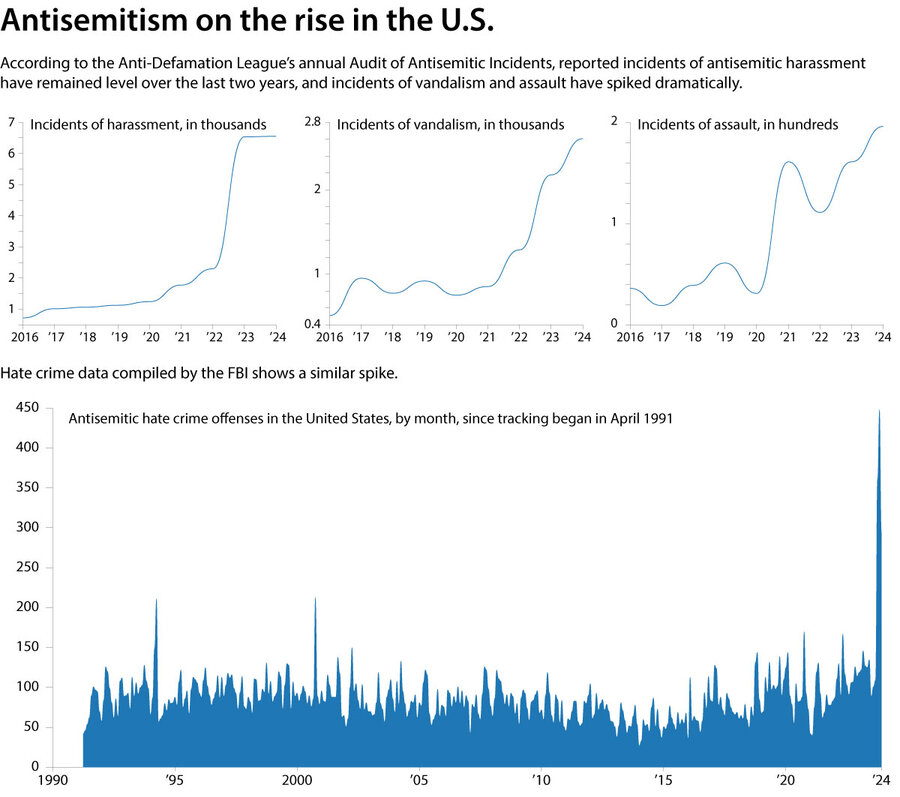Antisemitism reaches 45-year high in US. It’s ‘the canary in the coal mine.’
Loading...
| Washington
Antisemitism in the United States is surging to levels not seen in nearly half a century. A new report by the Anti-Defamation League (ADL) shows there was an average of 25 incidents per day over the last year – the highest since 1979, when the organization began tracking it.
In the United States, about 2% of the population is Jewish, yet Jews are targeted in more than two-thirds of religious hate crimes.
“Antisemitism is always the canary in the coal mine for the evisceration of the rights and dignity of all people,” says Rabbi Sharon Brous, founder of IKAR, a congregation in Los Angeles. “It’s a problem that not only endangers Jews but endangers democracy.”
Why We Wrote This
Over the past decade, attacks on Jews have jumped almost 900%, a new report finds. A rise in antisemitism has often been seen as a bellwether for threats to the rights and liberties of all.
While incidents jumped just 5% over the prior year, they are up 893% over the past decade. Rabbis and anti-terrorism experts interviewed say while both extremes of the political spectrum are seeing increases, they find the political finger-pointing on both right and left “maddening,” in the words of one rabbi.
“It’s bad wherever it is,” says Rabbi Rick Jacobs, president of the Union for Reform Judaism. “Wherever people are, they see it on the other side. And they don’t see it as honestly as they should in their own camp.”
The ADL found that incidents increased most sharply in two categories: assaults and vandalism. Both jumped by 20%. For the first time, the organization said, a majority of all incidents included elements related to Israel and Zionism.
While the war in Gaza has prompted widespread protests, opposing the policies of the Israeli government doesn’t constitute antisemitism, says Oren Segal, senior vice president of counterextremism and intelligence at ADL. For example, a placard reading “Free Gaza” at a protest would not register in the report as antisemitic. Spray painting “Free Gaza” on the wall of a synagogue would.
“When you hold all Jews accountable for the acts of a state – that is classic antisemitism,” says Mr. Segal.
On Passover, the Pennsylvania governor’s mansion was set on fire – while Gov. Josh Shapiro and his family were inside – by a man who police say blamed the governor for the deaths of Palestinians. He has been charged with attempted murder and terrorism.
“We would love if this could be fought surgically,” says Rabbi Moshe Hauer, executive vice president of Orthodox Union. The Biden administration offered support and sympathy, but did not back it up with sufficient action, he adds. He says he trusts Trump administration officials’ “genuine desire” to stop antisemitism.
“By saying there are going to be consequences, it has motivated change,” he says.
Over recent months, the government has canceled visas and detained foreign students who led protests and penned articles in support of a Palestinian state. It also cut billions of dollars of funding to research universities such as Harvard and Columbia, claiming those institutions failed to address antisemitism.
The ADL is among the Jewish organizations that support the arrest or deportation of students such as Columbia graduate and green card holder Mahmoud Khalil.
Antisemitism has taken many shapes over thousands of years, says Rabbi Moshe. “Our contemporary form is anti-Zionism.”
Others, like Rabbi Jacobs, view a distinction, saying, “There’s still debate over how to measure anti-Israel sentiment next to antisemitism.”
Rabbi Brous says it’s important to distinguish between the two. “When you call everything antisemitic, it makes it impossible to deal responsibly with the things that are antisemitic,” she says.
Rabbi Brous is among the Jewish leaders who oppose actions by the Trump administration that they worry are ineffective to fight antisemitism – and may in fact foment it.
“Nobody I know or respect is going to deny this is a very alarming situation that needs to be addressed. The question is: What’s the best way to do it?” says Rabbi Jacobs. “If a student is speaking out on an issue – maybe in a way that I find very objectionable – but they haven’t violated a law, they should not be deported.”
Both he and Rabbi Brous do not want to downplay what they call real safety issues for Jewish students on campuses. But they see education, community building, and clear disciplinary procedures as vital tools to healing the situation – not the government stepping in to deport people.
“[These actions] are also dangerous because they’re exploiting real Jewish pain and using Jewish suffering to harm other people – right now, Palestinian students and Palestinian sympathizers,” says Rabbi Brous.
She also raised instances when the president, Elon Musk, and administration officials dined with Holocaust deniers and platformed antisemitic tropes. When the United States Naval Academy purged 381 books from its library, books on the Holocaust were banned but “Mein Kampf” remained, she adds. The Trump administration, in her view, “has staked a claim on the side of Jewish safety at the expense of democracy.”
That sets up a "false choice," she adds, saying that the answer lies in defending both.
“If they’re going to overlook democratic protections for one, they’ll do it for others,” agrees Rabbi Jacobs. And that makes Jews less safe.








